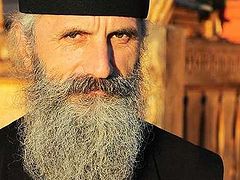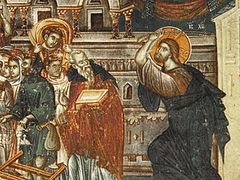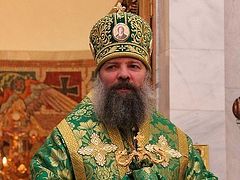Archimandrite Ilarion (Hilarion) (Dan), formerly a distinguished economist and today one of the most esteemed spiritual fathers in Romania, continues his reflections on the systemic crisis of modern techno-civilization and the purpose of human life.
—Fr. Ilarion, how can we speak about the Resurrection in a world that is surrounded by death and is being steadily covered by darkness?
—When we speak of the Resurrection we in fact speak of the deep and all-encompassing core of our faith, because if we didn’t believe in the Resurrection our faith would be futile. As the Holy Apostle Paul said: And if Christ be not risen, then is our preaching vain, and your faith is also vain (1 Cor. 15:14).
I like to repeat it during meetings with the faithful, with my spiritual children, and in my sermons that we Christians have the religion of life. This religion is opposed to the world we live in and our modern culture, which is the culture of death. That is why we must give praise to God because we are members of the Eastern tradition of the Church and because we have inherited this living faith from our fathers, forefathers and Holy Fathers of the Church. And we must bear this faith in our hearts and confess Christ, because the time we are living in is a time of confessors.
You are well aware that the modern world views Christianity as an obsolete faith with an outdated worldview. Today Christ is being excluded from public life, and we have already encountered this. Christ is being banished from the public sphere into the private sphere. And this confrontation between the Church and the modern world is becoming ever more apparent. We should be spiritually prepared to withstand the increasing pressure. “The waters are being divided”, as it were.
In any case, today the general tendency worldwide is estrangement from God. This tendency is seen in Romania as well. This is the spirit of Mammon, the preoccupation with material life and materialistic civilization. I recently read about the plans to implement ideologies intended to tear people away from our present world and make them cogs in the technologized civilization machine which knows no limits. Although it is the human beings that drive this technology forward, technology tends to hold complete sway over us. Now we can speak of a new stage of human civilization—that is, transhumanism, when man will be reduced to a mere silent and useless witness of the expansion of technology.
—And these ideologies and technology are above all hunting for young people.
—You are right, young people are above all subjected to attacks. And, unfortunately, educational systems worldwide no longer put emphasis on spiritual development—what matters to them is accumulation of information, and even this information is very limited because (isn’t it so?) people are no longer expected to know much—the more ignorant you become the more easily you are manipulated and brainwashed.
It is the case with Romanian education as well, which is becoming ever flimsier from this perspective. No one bothers to cultivate characters and set broad, noble cultural frameworks. Many subjects that are so important because they allow us to know the society we live in (such as history, literature, geography) are not represented to foster the formation of a generally strong culture. As you know, the way history is presented is crucial to our proper and objective understanding of it. It depends on who writes history textbooks and for what purpose. And today we see that school textbooks at times present our national history almost in a grotesque manner.
—Perhaps this is where the indifference to people’s own country, nation and Church stems from.
—Yes, this is the result of their upbringing. We don’t speak of patriotism anymore—a feeling that means that you love your country, your people and your ancestors. On the contrary, the feeling of aversion to your own tradition and culture is cultivated. What a pity! Because Romania is a country with very deep and rich cultural traditions.
Just imagine how little Romanians know of the history of their Church! And if you don’t know Church history, then it is hard for you to understand what the Church and Church tradition are like. They don’t have this knowledge at all. And do you see the paradox that appears here? We live in an age when we have easy access to information, information is plentiful, but for all that we are drowning in abysmal ignorance, with hardly any knowledge of the things which are of paramount importance in our lives.
—But father, in olden times our simple Romanian peasants knew the most important things in their lives without this information.
—Absolutely right. Because such was the mode of existence at that time. We are no longer organically integrated into the natural world created by God. Our forebears, our grandfathers lived in deep simplicity. They were bound to their grain fields, their livestock and all that surrounded them; their subsistence depended on a wheat kernel that was to sprout. People felt that all came from God, they lived simple, natural lives day after day.
And what about fasts that were observed in the most natural way? We don’t have anything natural anymore. The life of modern people is totally unnatural. The abundance of our times plunges us into a state of torpor.
Formerly, people on earth lived with God. A church would stand in the middle of the village, and it was at the hub of activity; everybody participated in such events as baptisms, marriages, and funerals—it was a living community. There were moral standards of communal conduct—no one stole anything because stealing was forbidden, so nobody even thought about this. My father (may God give him eternal rest!) used to say that when he was a boy they would never take a single straw from the fields—whoever dared to take anything home was considered a paltry fellow. And today stealing and lying are considered merits.
We are very, very far from what we are supposed to be. And this applies to us—people in the Church—too. We live as if we were very lethargic—a state that we have accepted, if not chosen voluntarily, ourselves. We are doing it of our own free will. We are fully responsible for this state of ours.
Our children, the youth, are attracted to this technology. Young people are quite taken with virtual reality, which is becoming a real world for them. There is the mirage of technology and the screen, which, of course, were invented to attract and lure, and it is like sweet poison. But how many people are aware of this?
Parents are so careless they allow their children free access to these instruments from infancy. You see, we live extremely, extremely superficial lives; we are in dangerous ignorance, which is bringing us to the edge of a precipice.
Today we have this deceptive comfort. Having everything near at hand, modern people become utterly engrossed in this secular, this-worldly pseudo-paradise and are content with it. These are the charms of the world, the trap that satan has opened wide before people, who throw themselves into it, as if enchanted by a pleasant scent.
—What can be done, Fr. Ilarion?
—Each of us should come to his senses. We should keep close track of the ongoing battle which in fact began long ago together with the Communist ideology which we went through and which is now taking the form of neo-Marxism, cultural Marxism. It is with surprise and regret that I have to state that our young people are exposed to the ideologizing processes without realizing this, and very many accept this ideology wholeheartedly. I hear young people speak up against tradition, Christian culture and the Church in public space without reasoning, without any knowledge of the Church of Christ or any idea of what being a Christian is like. All that is very deep in our national history is being emphatically rejected.
The Romanian nation is blessed with a unique spiritual heritage, but our youth are turning away from Orthodoxy. They fail to understand what a great gift of God they are rejecting. And it is really deplorable. But such is the result of inadequate education, as I’ve already said, and of the fact that we, those inside the Church, are unattractive to the externals. If we (members of the Church) were a living example of life according to the Gospel, if we were to set an example for them, become their role models, then the situation would be very different.
That is why we need to “reposition ourselves”, and this concern should be permanent because we can commit a blunder at any moment. We must control our spiritual trajectory all the time lest we should deviate from the path leading to Christ, just as we keep steering the car when we drive on the highway. It is a constant control, a state of continuous presence, as Elder Arsenie (Papacioc) used to say1.
So let’s be true confessors of Christ! To witness to Christ means to follow Christ in all things. You are not a Christian if all that you have is a label—you just were born to a Christian family and were baptized. Besides, most Romanian families are no longer genuinely Christian because they don’t live in the Orthodox spirit anymore; rather, they live in the spirit of this world and only care about material things.
Money is the world’s new idol. Someone who is completely absorbed into materialism needs nothing but the fulfilment of his carnal desires, thus money becomes the only means by which he satisfies his needs and passions. And children grow up in an environment like this.
People often ask me if the parents’ sins are inherited by their children and I reply that it is not a mechanical inheritance—it happens when a child lives in a specific environment, in a family where some behavior patterns and some passions are demonstrated. Every family has its own spirit and children absorb it as they grow up. If the parents demonstrate deep, genuine, pure love for God, then the children will naturally grow up in this love. If what is demonstrated in the family is passions, they imbue their children with them with all the ensuing consequences.
This is the way out: to live true Christian lives, return to Christ and confess Christ by our whole lives! Going to church, lighting candles and venerating icons is not sufficient. These are just outward forms, which must be the expression of a deep, inner spiritual life. If we don’t live by Christ every single moment, if what we have in our hearts is not Christ but something else (in most cases—our good selves), then we stay alone with ourselves, without Christ. And what can we get from ourselves? Our passions. All that is good and beautiful and has to do with life comes from God.
We live through this centuries-old drama when we have the label “Christians”, while we are not Christians in practice. But drama may turn into tragedy because death will come unless we come to our senses. And we get each other involved in this death. That is why we live in a world which has been seized by despair, psychopathy, various neuroses and other evils of all sorts that have power over contemporary people; we experience this emptiness, this inner abyss. Once we have lost the light of Christ, what else can we have inside ourselves?
—You’ve said that we are far from the state of true Christians. What message of Resurrection can be addressed to people who are Christians in name only?
—Now, during the period of fast, we ought to think more deeply of the purpose of our lives, of what we are and what we want to be. Do I really want to live? Do I want to be alive?2





